 Selfadvocatenet.com is in support of Community Living Month of October 2021
Selfadvocatenet.com is in support of Community Living Month of October 2021
Selfadvocatenet.com is going to highlight the achievements in Community Living movement.
Also add to self advocates have contributed to the movement. And to try to highlight business that have hired people with disabilities to.
Stay tune is when I receive news it will be posted here on this page thought month of October.
Why do we Have a Community Inclusion Month?
The reason we celebrate Community Inclusion Month is because prior to 1980 society segregated people with disabilities in institutions, in sometimes remote geographical areas. Institutions eliminated access to typical community settings with limited interactions with community members and restricted the types of activities a person can do; and placed little, if any, emphasis on developing and supporting social relationships.
We celebrate Community Living Month because of the sustained efforts of the families and the Community Living Movement in British Columbia that resulted in the closing of institutions throughout the province. Subsequently, people with intellectual disabilities were moved into the community, where services are delivered by agencies like CVS.
We also celebrate to raise awareness of the barriers to inclusion: in which people are ranked according to income, age, station, race, family contacts, and gender. One other aspect of social ranking is how people are ranked in terms of ability. Another aim of Community Living Month is that we need to look at peoples strengths, abilities, and assets rather than looking at deficits or what people cannot do.
We are not alone. CVS and other associations for community inclusion across the province of British Columbia come together through the auspices of Inclusion BC to learn, improve practice, and conduct advocacy. In turn, Inclusion BC is but one of many provincial partners in the Canadian Association for Community Living (CACL), which brings together Canadian provincial associations at the national level. Along with other like-minded associations across the globe, CACL conducts similar inclusion-seeking activities within Inclusion International. The driving force behind these organizations is people with intellectual disabilities and their families, along with many dedicated staff and professionals.
As a member organization of Inclusion BC, CVS supports the statement of values and principles: We believe that remembering and sharing our history will help guide and build our vision for the future; that inclusive communities enrich the lives of all citizens; that services and supports must be delivered in a way that respects an individual’s diverse history, culture, race, religion and sexual orientation; that real work means real pay; that all children have the right to be educated in regular classrooms with appropriate levels of support.
The aforementioned are the values and principles that Community Inclusion Month seeks to promote. So, during the month of October we should pay special attention to increasing inclusion in our communities and pay particular attention to how we personally make our communities more inclusive as friends, employers, public servants and service providers.
This is from site from Community Ventures go to the link here
Dan Coulter in leg today October 21st,2021 said in Recognizing it is Community Living Month in BC
Transcript what he said here below.
PROCLAMATION FOR BC COMMUNITY LIVING MONTH
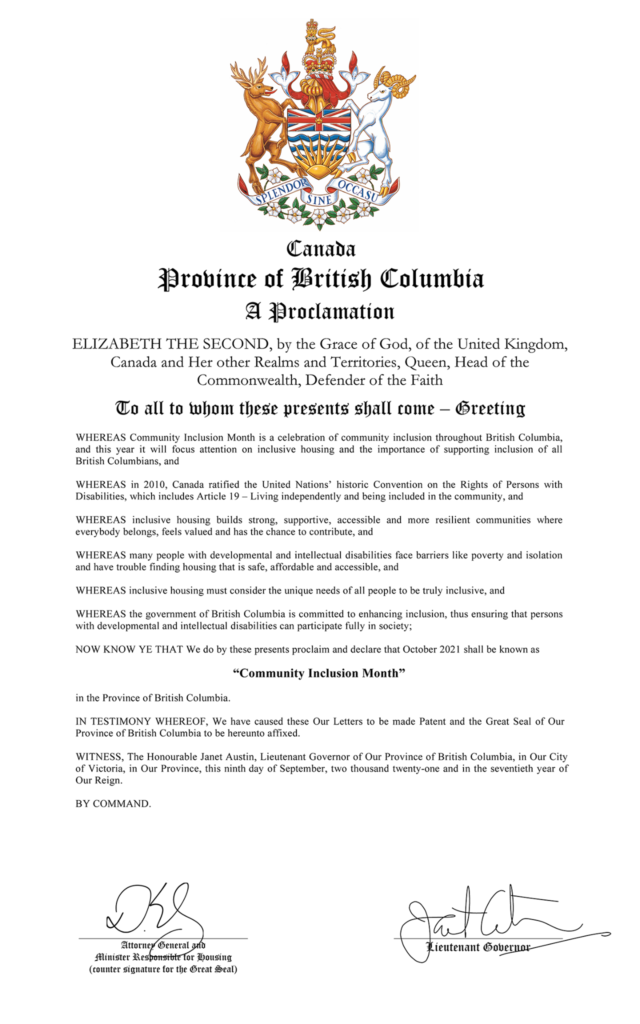
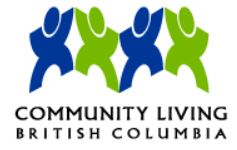 Every year Community Inclusion Month is celebrated in October in communities across B.C.
Every year Community Inclusion Month is celebrated in October in communities across B.C.
2021 is the second year where we must celebrate with an ongoing pandemic. After months of isolation, we understand more deeply than ever the importance of being connected and being part of a community of friends and neighbours.
CLBC honours and celebrates self advocates who are showing us their strength and leadership, resilient family caregivers, creative support workers and communities that have taken steps to support everyone. During Community Inclusion Month, CLBC will be recognizing some of these people through our Widening Our World (WOW) awards. Winners will be announced here in October.
This year, CLBC is also joining Inclusion BC to raise awareness about inclusive housing and its importance in making sure our communities are open and welcoming to people with disabilities. You can find a short, informative video about the need for inclusive housing as well as resources to help build awareness on the Key To Home website here.
Highlights
During Community Inclusion Month this page will be updated to share the different ways people are celebrating the month, including stories and proclamations from local communities.
Stay tuned to this page for updates, and you can also visit CLBC’s Facebook page here and Twitter page here to see what’s happening across the province.
Have an event, story or other highlight you’d like to share? Send an email to CLBCInfo@gov.bc.ca and let us know.
Inclusion BC will also be hosting information on its website here.
We wish you a safe, healthy and happy Community Inclusion Month 2021!
This on CLBC website go to the link here
Inclusion BC celebrating Community Living Month
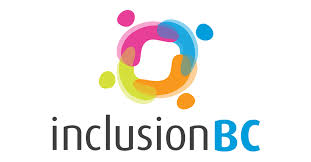
OCTOBER 2021 IS COMMUNITY INCLUSION MONTH
Opening the Door to Inclusive Housing
The B.C. government has proclaimed October 2021 as Community Inclusion Month. In the month of October, communities across B.C. are promoting inclusion, celebrating diversity, and bringing awareness to the strengths and abilities of people with intellectual and developmental disabilities.
In 2010 the Canadian Government agreed to follow the United Nations Convention on the Rights of Persons with Disabilities (UNCRPD). This official document helps governments and communities protect the human rights of people with disabilities. Article 19 in the UNCRPD says people with disabilities have the right to live independently and be included in the community.
This year Community Inclusion Month will focus on inclusive housing, because all people have the right to live and belong in their community and everyone deserves a place to call home.
From years of working with people with intellectual and developmental disabilities, their families, and the organizations that serve them, we know that:
- Inclusive housing builds strong and accessible communities where everyone belongs, feels valued, and has the chance to contribute,
- Many people with intellectual and developmental disabilities face barriers like poverty, isolation, and need housing that is safe, affordable, accessible and,
- To be truly inclusive all housing must consider the unique needs of all people.
Links to the work on increasing access to inclusive housing for people with disabilities in B.C.
- “Home is where our story begins” a 2018 report from the Inclusive Housing Task force
- Key to Home campaign created by Community Living BC and Inclusion BC
During October 2021, you are invited to join B.C. communities and celebrate Community Inclusion Month 2021 – Opening the Door to Inclusive Housing.
For updates and events follow @InclusionBC on Facebook and Twitter. We also hope you’ll share upcoming virtual and in person Community Inclusion Month celebrations on social media with #Inclusion2021 #CIM2021 and #CommunityInclusionMonth.
Proclamation for Community Inclusion Month 2021
This on Inclusion BC website go to the link here
Inclusion BC Community Living Month Flash Mob – Photos and Video
These Self Advocates Are Rocking It!
The Self Advocates of the Rockies are making a big impact
By Spencer van Vloten
BC Disability
October 18th, 2021
From Cranbrook, the Self Advocates of the Rockies (SOAR) have been leaders in the self-advocacy movement, travelling internationally to help educate communities about inclusion. To learn more about SOAR and what Community Inclusion Month means to its members, Spencer van Vloten spoke with SOAR members Lynnetta Beingessner, Kimberly Earl, Sheila Neidig, and Raymond Edinger, along with supporter Janine Moore.
SEE MORE: SELF ADVOCATES OF THE ROCKIES
One of SOAR’s strengths is the diversity of its membership, which allows the advocates to feed off each other’s strengths and learn from one another. Kim joined the group in October 2020 and is relatively new to self-advocacy, but has quickly made an impact. For Lynnetta it all started when she moved to Cranbrook and began living on her own in 2012. She soon realized she had a powerful voice and the ability to help her friends, and started advocating for herself and community members in Cranbrook and around BC. Raymond has been participating in self-advocacy conferences for 12 years, and has gotten to travel across the world helping educate others and advocate for inclusion. And the most experienced advocate is Sheila, who has been at it for nearly 30 years!
WORLD TRAVELLERS
One of the group’s most memorable experiences was journeying across the pond to England, for Inclusion International’s World Congress. Here they made friends and met self advocates from as far away as Japan, Hong Kong, and Austria. They learned that many countries still institutionalize persons with diverse abilities, and that Canada, despite have room for improvement, is a world leader in inclusion.

They also gave a presentation on home sharing, using their knowledge and experience to educate self-advocates from countries where home sharing is uncommon but could help many people gain independence. During their trip in England, the group also got a reminder of home, spotting a Cranbrook Street and the Cranbrook Hotel! Near the end of their stay in England, Lynetta discovered a book about rights, and on returning home the group translated it to plain English for self advocates to use in Canada.
CREATING CONNECTIONS
The group was excited about continuing their travels and looking forward to a conference in Saskatoon when COVID hit. While they were disappointed, they immediately got to work in helping self-advocates throughout the province during this difficult time.
SOAR was one of just 2 groups to receive a $30,000 grant from Community Living BC, to organize virtual community events which connect self advocates from across the province. In the process, they became a legal business – an accomplishment showing the power of teamwork. Being tasked with such a big responsibility was intimidating at first, Kim notes, but once the group got to work they hit their stride and became more confident as leaders and public speakers.
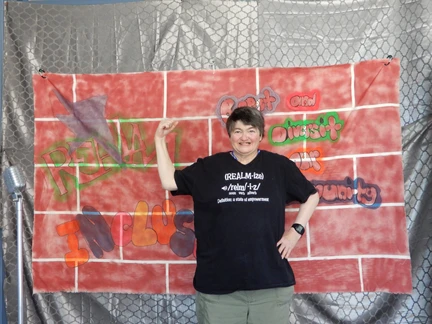
SOAR held a talent show in the spring, a fall conference where Lynetta showed her MC skills, and a health conference to help educate self advocates about self-care practices. Lynetta also ran her own COVID Blues group, and as she said about the experience “it was really special to take that money and help people stay connected during a difficult time. ” “We wanted people to get out and have their voices heard, to get out of blues, and still do things.”
A MONTH OF MEANING
October is Community Inclusion Month in BC, celebrating the community participation of British Columbians with diverse abilities. What does Community Inclusion Month mean to the Self-Advocates of the Rockies? For Kim, it’s a time to give back to those who’ve given to her. “It’s important because the community does a lot for us. So in the past we’ve had lots of events and stuff like picnics and acting productions for Community Living Month, it’s a time for us to give back.” It’s a time for us to give back For Sheila, it means getting everyone in the community to join in, accepting them regardless of ability, and for Ray it’s a time to celebrate being connected to one another. Although they haven’t been able to hold the in-person events they usually do, SOAR continues to celebrate Community Inclusion Month and to work toward building a more inclusive BC.
ADVOCACY, PODCASTS, AND DISNEY WORLD
While the pandemic disrupted the normal way of doing things, SOAR has continued meeting using a hybrid format – some people in-person, some online, and some over the phone – and is looking forward to what the future brings. Lynetta’s excited for more people to join the group and to continue with advocacy. Sheila and Ray are both eager to travel again, and meet other self-advocates from across BC, Canada, and the world. Kim’s eager to travel as well, and is looking forward to her upcoming birthday, hoping to spend it at Universal Studios to enjoy the rides and Harry Potter World. She’s also got a podcast in the works so that self-advocates have a new platform to speak their minds. And she has a message for all self-advocates.“We’re almost done with the bad. There’s light in the tunnel, in being able to travel more and do more stuff. Just hold on, don’t give up.”“Look forward to future, but also be thankful for the things you’ve accomplished during all of this.”And that’s advice we should all live by.

Spencer van Vloten: With intellectual disabilities, we all have a part to play in the inclusion
By Spencer van Vloten

Next time you are out and about in the community, take a minute and scan your surroundings.
You may be waiting at a bus stop, chatting outside with the neighbours, or relaxing between classes at a favorite campus coffee shop.
Now take note of who you see, then take note of who you do not see. Chances are you will not see one of the thousands of British Columbians with an intellectual disability.
British Columbians with developmental delays or conditions such as Down syndrome were once considered ‘incurables’, confined to institutions like the infamous Woodlands so they would be out of public view, existing separately from society.
Although thankfully, this degree of exclusion no longer persists, the community inclusion of persons with intellectual disabilities still is not where it should be.
And at the root of this are our attitudes.
One of our more problematic tendencies as humans can be that we too often focus on what sets us apart rather than what we have in common. For decades, people with intellectual disabilities have been cast as the other, and societal practices have reinforced that attitude.
In schools, students with complex needs have been segregated in cohorts where they have little to no contact with most of their same-age peers. In employment, sheltered workshops have seen disabled persons isolated from the rest of the workforce and paid less than their non-disabled counterparts.
Practices like this helped entrench society’s attitudes that people with disabilities exist separately from those without them: they are not people we make friends with; they are not people we work with, and they are not like us. They are just different.
But whatever differences may exist, these are vastly outnumbered by what we share.
People with intellectual disabilities have goals to live independently, to pursue friendships and love, and to find work they enjoy—much to the benefit of employers and colleagues, I might add, who are proven to make gains in morale and productivity when disabled employees are part of integrated work environments.
People with intellectual disabilities are also insightful, funny, and kind, sharing the same interests in things like hockey, Netflix, music, and art that nondisabled persons do.
And they are incredibly capable, especially when their communities are most in need.
Take, for instance, the Self-Advocate Leadership Network. Formed by two friends with intellectual disabilities, they organized a province-wide advocacy network and delivered in a major way during the pandemic, connecting community members to crucial information and social support.
It was also, in part, due to their advocacy that B.C.’s essential-visitor policy changed, allowing families to be with loved ones in care homes and hospitals.
Why am I bringing this up now? Because October is Community Inclusion Month.
Officially declared as such by the province, it is a time to celebrate the participation of persons with intellectual disabilities in our communities and to reflect on our own views of inclusion. It is also a time to analyze what improvements need to be made.
This includes all levels of government providing greater funding and policy support for inclusive, accessible, and affordable housing developments; it includes creating more opportunities for persons with disabilities to pursue the occupation of their choosing, along with the training required to make that possible.
And, most importantly, it includes a change in attitude that recognizes that persons with intellectual disabilities are not some “other” to be cast aside but human beings with goals, feelings, and family just like you and me. Without this attitudinal shift, none of the other changes will be possible, nor will we be a truly inclusive society.
So the next time you look around and do not see anyone with an intellectual disability, ask yourself why that is and whether there is anything you can do to promote inclusion, be it through hiring someone with a disability, volunteering with a disability organization, or simply smiling and saying hello if someone with an intellectual disability does cross your path.
Only when these become the status quo, our way of doing things without having to think about them, will the inclusion of British Columbians with intellectual disabilities be where it needs to be.
Let’s embrace our similarities, celebrate our differences, and aim for a B.C. where everyone can fully participate during Community Inclusion Month and beyond.
Virtual inclusion dance party for Maple Ridge and Pitt Meadows residents happening this October
Event organized by the Life After School Transition committee
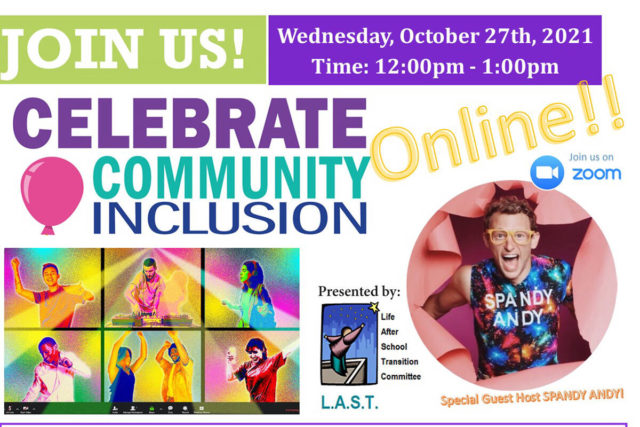
A dance party to celebrate diversity and inclusion is soon coming for Maple Ridge and Pitt Meadows residents virtually.
For Community Inclusion Month, the Life After School Transition (LAST) Committee has been holding an event every year in October, as a time to celebrate the abilities and achievements of people with developmental disabilities and promote community inclusion.
LAST includes members from Community Living BC, Ridge Meadows Association for Community Living, School District 42, BC Ministry of Children and Family Development, Maple Ridge/Pitt Meadows Community Services, BC Ministry of Social Development and Social Innovation, possibilities, Work BC, STADD (Services to Adults with Developmental Disabilities), Ridge Meadows Recycling Society, and Maple Ridge Parks, Recreation, and Culture.
In the past, this event has taken place at the Greg Moore Youth Centre and included a free BBQ, live band, and other activities, but because of COVID-19, organizers have moved everything online.
This is on a website called Maple Ridge News go to the link here

